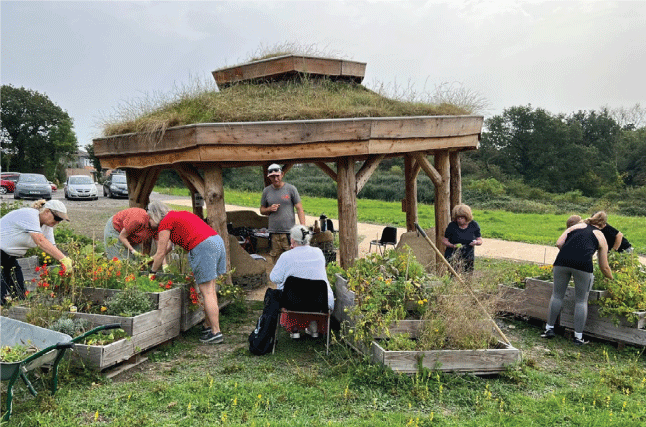
The Great Outdoors: An Outdoor Wellbeing Group for People Living with a Congenital Heart Condition
Rebecca Wiliams, Patient Representative, Cardiff and Vale University Health Board Dr Anna McCulloch, Consultant Clinical Psychologist, South Wales Adult Congenital Heart Disease Service, Cardiff and Vale University Health Board
Individuals living with a Congenital Heart Condition (CHC) are at significant increased risk of developing mental health conditions such as anxiety and depression. Experiencing depression is a risk factor for illness severity. Promoting good mental health amongst this population can reduce the health inequalities experienced by this cohort and can improve their overall health and quality of life. This outdoor wellbeing group sought to improve the physical and mental wellbeing of people living with CHC’s in South Wales. The project took place at The Health Meadow at University Hospital, Llandough. The group learned to care for the meadow, developed peer relationships and discussed helpful ways of coping with their health condition. Activities were adjusted according to need to ensure inclusivity. Group members reported improvements in wellbeing, self-confidence, social connection and in attitudes towards fitness and exercise.
There are many factors that contribute to the psychological- social difficulties faced by individuals living with a CHC. Living with a CHC can disrupt normal developmental stages and can have a significant negative impact on educational attainment, the development of friendships and on feelings of self-efficacy and hopefulness (1). Such challenges can be made harder by the impact of worsening symptoms and uncertainty about health outcomes. Psychological wellbeing, social connection and engagement in movement and exercise are predictors of health outcomes in CHC’s. For example, experiencing depression or anxiety is associated with poorer health outcomes (1).
We describe an 18-month collaboration between our South Wales Adult Congenital Heart Disease (ACHD) team, Cardiff and Vale Health Charity and Down to Earth. Group members attended weekly, four-hour sessions based in The Health Meadow at University Hospital, Llandough. The sessions involved learning how to care for the meadow and learning new skills. Members
had access to support from the clinical psychologist and an ACHD nurse. Group based interventions encourage peer support and can reduce feelings of isolation. Access to nature improves wellbeing (3). Engaging in meaning activities and learning new skills encourages wellbeing and self-efficacy (4). Qualitative and quantitative feedback demonstrated improvements in: Peer relationships and feelings of social connection that were maintained outside of the group setting
Feeling connected
to nature
Self-confidence
Relationships with
the ACHD team
Coping skills
Confidence in exercising
and moving
Examples of quotes include:
“The others I have met and what I have achieved has been a source of encouragement and a can-do attitude”.
“I took a run up a hill yesterday. That has never been me”.
“I don’t know where I would be without this group”.
The key learning from this project highlighted that:
- Peer support is important for those with CHC’s and encourages feelings of inclusion and social connection. This connection remained once the project had ended.
- Providing an outdoor space on a hospital site meant group members associated the hospital with positive experiences and reduced the anxiety experienced when attending hospital appointments.
- Having nurses attend the sessions improved patients’ confidence in participating in physical activities and improved nursing-patient relationships, making clinic appointments less stressful. Some group members went on to exercise independently.
- Having access to a clinical psychologist helped encourage shifts in thinking and behaviour.
- People living with a CHC face barriers in accessing (1) outdoor spaces, (2) opportunities to learn new skills and (3) places to exercise. This project shows the benefits of providing service specific groups to help provide patients with these opportunities.
References
- (1) Livecchi, T. & Morton, L. (2023). Healing Hearts and Minds. A Holistic Approach to Coping Well with Congenital Heart Disease, Oxford Press.
- (2) Kovacs, A.H., Brouilette, J., Ibeziako, P., Jackson, J.L., Kasparian, N.A., Livecchi, T., Sillman, C., & Kochilas, L.K. (2022). Psychological Outcomes and Interventionsfor Individuals with Congenital Heart Disease: A scientific statement from the American Heart Association. Circulation: Cardiovascular Quality and Outcomes, 15, 8.
- (3) Capaldi, C.A., Dopko, R. L. , Zelenski, J.M. (2014). The relationship between nature connectedness and happiness: a meta-analysis. Front Psychol, 5, 976.
- (4) Davies, J., McKenna, M., Bayley, J., Denner, K., & Young, H. (2020). Using engagement in sustainable construction to improve mental health and social connection in disadvantaged and hard to reach groups: a new green care approach. Journal of Mental Health, 29, 3, 350-357.
